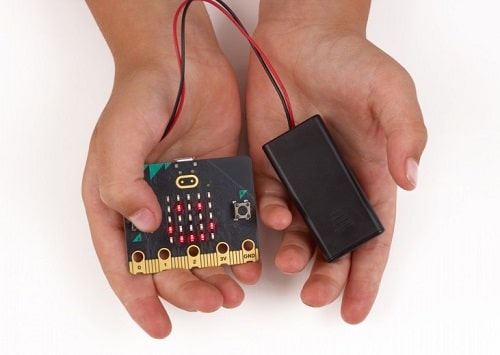The mini computer enables children to learn the basics of modern computing and get hands-on training through interactive projects

element14, an Avnet Company and manufacturing partner of the Micro:bit Educational Foundation is pleased to announce the manufacture of 5 million BBC micro:bit devices since its launch in 2016. The micro:bit has been adopted by multiple global educational organisations to support STEM learning through formal programmes, helping the Foundation reach an estimated 25 million children in more than 60 countries who have learnt digital creativity and computing skills. The micro:bit has been adopted by educational organisations around the world to support Science, Technology, Education and Mathematics (STEM) learning programmes.
With this announcement, the Micro:bit Educational Foundation has enhanced the micro:bit offering to a greater memory capacity, a faster processor and an “out of the box” sound and touch functionality.
element14 has worked with multiple educational organisations and governments to support strategic rollouts of STEM learning solutions into the classroom, and stocks a broad range of education devices that can be supplied in class, school and multiple-school quantities.
About micro:bit
The BBC micro:bit is a pocket-sized computer, which when programmed, allows you to interact with your surrounding world. The tiny board consists of an LED light display, buttons, sensors and many input/output features.
The tool is a good medium for children to understand how computers work. It allows us to grasp the working of input and output devices in conjunction with a processor.
To get started, all you need are:
⦁ Micro:bit board
⦁ Battery pack with 2 AAA batteries
⦁ USB lead to connect your micro:bit to your computer
Computer programs for micro:bit can be written using MakeCode or Python coding languages.
Using LEDs and buttons, children can learn to make a host of projects such as emotional badges and mini-icons. With the help of built-in sensors such as accelerometer, temperature and light sensor, and compass, the micro:bit can be used to sense movement, light, temperature and magnetic fields.
Also, by using radio and pins, micro:bit can be used for communicating wirelessly with other micro:bits, leading to the development of projects that involve wireless messaging.
The new BBC micro:bit comes with:
⦁ Onboard speaker
⦁ MEMS Microphone with LED indicator
⦁ Touch-sensitive logo
⦁ Built-in sleep/off mode that means the board can be powered-down with batteries connected
⦁ Discrete regulator that can supply up to 200mA of current to external accessories
“element14 is proud to be the Micro:bit Educational Foundation’s exclusive manufacturer and we are delighted to join our partners in celebrating the manufacture of 5 million micro:bit and their announcement of an updated micro:bit,” said Lee Turner, Global Head of Semiconductors and SBC at Farnell and element14
element14 also provides a range of resources to assist educators and parents supporting children with STEM, thanks to its STEM Academy, which provides a wealth of content and support for those looking to get started with the micro:bit. This dedicated online hub helps explore learning concepts and classroom-based design projects within the electronics and digital space.
The element14 community’s The Learning Circuit series features several instructional videos, which take viewers through different ways to learn and explore with micro:bit.
The new micro:bit can be obtained from element14 from mid-November 2020 onwards.






